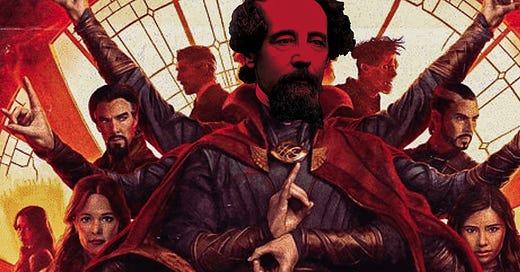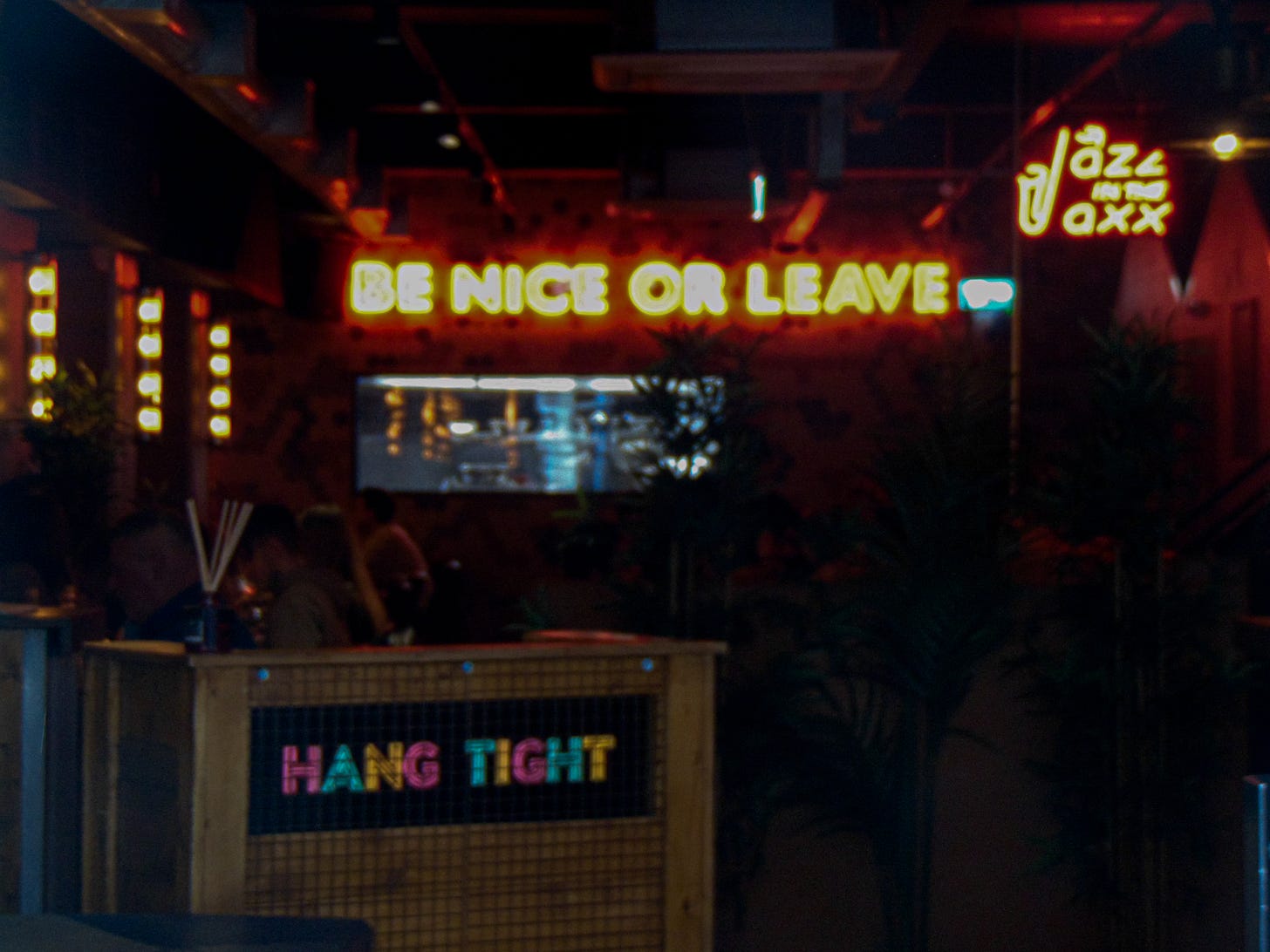Charles Dickens and the madness of the multiverse: July 2023 Essay Recommendations
Also: Jesus and Sandman fight Satan, and actual definitions for truth, beauty, and goodness
Happy end of July! It’s always hard choosing just what to put in these roundups. But sometimes hard things are worth it.
Also, a programming note: publication of the next (and penultimate) entry in the aesthetic series (expected August 5th) will be pushed back by a week or more as I’m taking time to recharge, research deeply, explore parts unknown, and move some intellectual loose ends closer to completion before a hectic stretch.the inescapable Charles Dickens
I thoroughly enjoyed this essay by bestselling novelist Zadie Smith. Of course, the title — On Killing Charles Dickens — is captivating. Killing Charles Dickens? What does she mean? She means to excise his influence from her life and work, to hold what has shaped her at arm’s length (as has become fashionable to do) and examine it outside herself. Which is hard when you’re British (and a member of the English literati) because Dickens’ shadow looms over the island and its literary establishment.
To be my age, bookish, and born in England was to grow up under that tiresomely gigantic influence. Dickens was everywhere… I personally read far too much of him as a child, and though I grew up to have all the usual doubts and caveats about him—too sentimental, too theatrical, too moralistic, too controlling—I was also never able to quite get out from under his embarrassing influence, as much as I’ve often wanted to… There didn’t seem to be a nineteenth-century pot he didn’t have his finger in.
Zadie left England and resisted the urge to write a historical novel—for a while. Eventually, just such an idea had her returning to the Dickens-haunted realm.
multiverse or bust
Everywhere we look, dreams of the multiverse abound. If The Lion, the Witch, and the Wardrobe were written today, Peter would still ask the professor, “You really mean that there could be other worlds—all over the place, just round the corner—like that?” And the answer would still be “yes.”
But what does pop culture’s obsession with multiverses say about where our society finds itself in the present moment? I’ll recommend a couple of pieces that explore that question.
The first from The Economist, Why the multiverse is eating popular culture, argues that
these films are […] obsessed with choice and contingency. When the show ends and the lights come up you can feel less inspired than sad, considering a society suffused with regret, more preoccupied with individual trauma, […] sorting out the past, and recycling its tropes, than dreaming of the future.
The escapism on offer is not just the old comic-book fantasy of a humdrum existence transformed by a spider bite. It is that in another reality, right now, the audience member might have made choices that led to a grander life, or at least Hillary Clinton might have campaigned harder in the Midwest.
In Why Multiverse Stories Let Us Down, Brett McCracken at The Gospel Coalition suggests these stories are a type of “secular transcendence” which still doesn’t work without solid handles of actual meaning.
In both The Flash and Across the Spider-Verse, this comes in the form of “inevitable intersections” and “canon events” that function as divinely orchestrated, fateful moments where multiple timelines and universes intersect. In a world where so much is within our power to control, reboot, or timeline-shift, canon events are unavoidable, preordained moments we can’t manipulate. They’re on a higher plane that approximates godlike transcendence, and in some mysterious way, they bring purposeful meaning to an otherwise anything-goes multiverse.
Side-piece: This lengthy New Yorker report, How the Marvel Cinematic Universe Swallowed Hollywood, provides the fascinating history of how Marvel Studios became the cultural juggernaut it is today.
Sandman and Jesus harrow Hell
There’s nothing I love more than earnest interaction between popular myths and deep, gutsy theology. Hence this recommendation of David Armstrong’s Harrowings of Hell in Sandman and Christianity which analyzes the (excellent) episode of Netflix’s Sandman adaptation in which Dream of the Endless visits Hell to retrieve the tokens of his power. Armstrong contrasts Eastern and Western church interpretations of Jesus’ descent to Hell.
…the Eastern doctrine of the descent into Hades is the more impressive one. First, Christ does not ask to be let in: he either sneaks in clandestinely, like the thief in the night about whom he parabolized, or he breaks down the doors themselves, upon which he stands pulling Adam and Eve out of their graves in the traditional Byzantine iconography of the scene. Early Christian literature, hymnography, and iconography frequently depicts Christ’s katabasis as an invasion of the infernal world that leaves it decimated and empty, except for an enchained Satan.
Such a juicy piece.
defining truth, beauty + goodness
Words like truth, beauty, and goodness are constantly used in an aspirational sense. We pursue them in our lives and aim to convey them through our art. But words too long undefined lose their meaning. And when Sara Kyoungah White asked Jessica Hooten Wilson, hey, what do you mean when you say these words? I was impressed with her answer.
I do think people need to make sure to define their words because you don’t want truth, goodness, and beauty to be a catch-all. So, I’m talking about a truth that is asymptotic, that we are trying to get towards. That’s a phrase that David Lyle Jeffrey uses to describe truth in the sense that it’s always beyond us, always mysterious, can’t be claimed by an ideological side, and cannot be manipulated or exploited. It’s something that we are constantly trying to learn about, and always seems to be higher than we could imagine….
I would say goodness and beauty parallel that, right?…
The same goes for beauty. I love talking about beauty in the sense of the transcendental, because it's something that all of us recognize. When Notre Dame Cathedral burned down and the whole world started sending their money that direction, it was a clear indication that there are things that are beautiful, that kind of encapsulate the transcendental beauty, and show what beauty could be—and we do recognize it when we see it, and we all long for it.
There’s more truth, beauty, and goodness where that comes from in
’ interview with Jessica Hooten Wilson.big sad
I hate to end on a low note, but
claims the Information Age is ending because there’s a lot less actual information going around. This post rung about 30 mournful bells.Also, has anyone heard anything about Threads since about ten days ago? Is it another Google+? Did Elon Musk steal Zuck’s thunder by renaming Twitter to X? In another post, Gioia documents his first few days with Threads likening Zuckerberg to a Roman Emperor: “…the emperor is Mr. Z, and he has become a master of the imperative mode. He commands, and we obey.”
I’m not sure how to describe this platform, but it is certainly not a community.
It feels more like a panopticon—that circular prison, where everyone is under surveillance and only sees what they’re supposed to see.
After a few days on Threads, I couldn’t shake off the pervasive sense that this platform is a playground for powerful institutions, consumer brands, and celebrities. It’s not for me.
But it needs me. Or, to put it differently, it needs a lot of people like me. Because Nike wants a captive audience. So somebody needs to play the role of captive.
All this is captivating because my next graduate course centers around social media and marketing on the internet. It’ll be interesting to see how these recent upheavals shape classroom conversations.
Hang tight, till next month at least!









I knew staying off threads was a good call! Meta has me thrice, it’s not attaching a fourth string to this puppet!
I’d be interested to know your thoughts on Twitter but also, especially in relation to aesthetic, Instagram and Pinterest as digital places that can shape our analogue mindsets and lives.